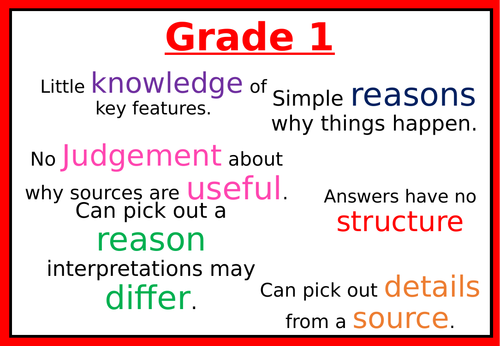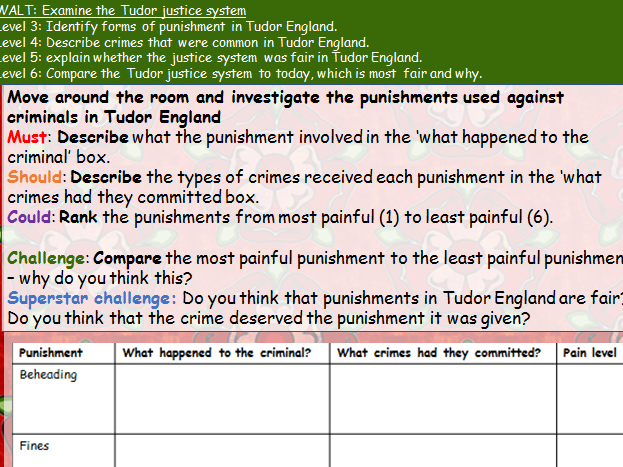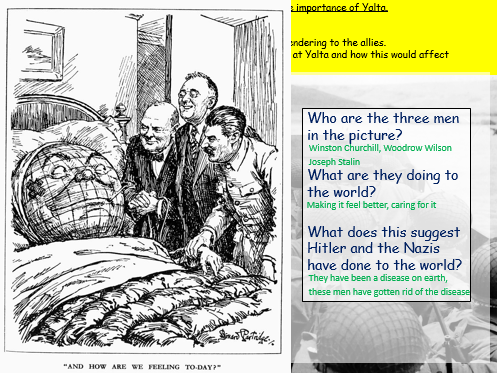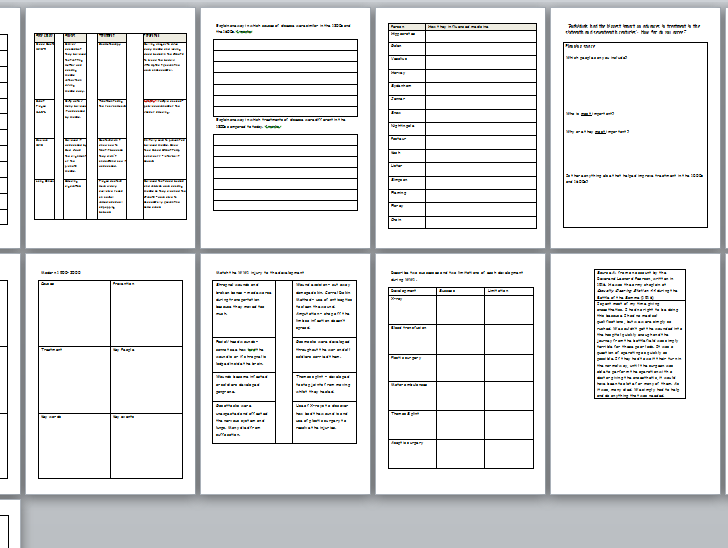
177Uploads
76k+Views
24k+Downloads
All resources
Bundle

KS3 WW2 bundle
This unit of work has been created to embed and develop skills required at KS4 within KS3 written responses. Skills developed include source work (Interpretations and sources) as well as narrative account, consequences, and PEEL paragraphs.
Bundle includes lessons about:
D-Day
Defeat of France
Hitler’s defeat
Invasion of Poland
Operation Barbarossa
Pearl Harbour
The Blitz
WW2 Dictators

Grade Descriptors Edexcel History Display
Display created to inform pupils what is required for the new specification. goes from 1-9, I used the specification grade boundaries to create this display, the wording for g8-9 was identical which is why this grade boundary has one page rather than two.

Weimar and Nazi Germany Timeline and Lesson (Edexcel 9-1)
Timeline with sections for pupils to create - worksheet to support.
Fully differentiated lesson to go alongside the timeline.
Starter: structure of Paper three
task one: overview video
Task two: timeline - defining key words, describing key events and extension task
Whiteboard AFL
Task Three source work - why vote for hitler? challenge: making links to key events on the timeline
Task designed as an introductory lesson to paper three to give pupils an overview of the topic so assumes no prior knowledge but could also be used as a revision task.

KS3 D-Day (WW2)
WALT: Explain why the Axis forces were defeated at D-Day.
Level 3: Identify hidden messages in US propaganda.
Level 4: Describe the key events of the D-Day invasion.
Level 5: Explain why Allied tactics lead to success.
Level 6: Compare the Allies and German tactics to explain why the Allies won.
Pupils analyse a source, follow a carousel to create the battle plan shown as the cover image, then read a source to compare British and German weaponry before creating a newspaper article about the invasion.

Chronology (What is history? (KS3))
Pupils explore the concept of chronology and how it supports historical learning, they are also introduced to the concept of a turning point and identify turning points in their own lives/across history. Includes a chronological order game of significant events from history.
WALT: define chronological order and apply this skill to historic events.
L3: Define what the term chronological means.
L4: create a timeline of events from history in chronological order.
L5: Explain what a turning point is.
L6: Apply skills to a timeline of my own life and evaluate the biggest turning point in my life so far.

Tudor Crime and Punishment
This is a lesson aimed at KS3, it provides an overview of crime and punishment in Tudor times.
Pupils complete a carousel around the room in order to analyse the punishments that people received for certain crimes.
They then decide which punishments the criminals deserve (Anne Boleyn and Thomas Cromwell included) before comparing whether the Tudor justice system is fair with today’s justice system.

KS3 Hitler's Downfall (WW2)
This lesson covers:
The Battle for Berlin
Hitler’s suicide
Yalta Conference
Pupils will:
WALT: Explain why the Nazi’s surrendered to the Allies and the importance of Yalta.
Level 3: Identify what position Germany was in by 1945.
Level 4: Describe the key events of the Battle for Berlin.
Level 5: Explain how the Battle for Berlin lead to Germany surrendering to the allies.
Level 6: Compare sources to analyse what the Big Three wanted at Yalta and how this would affect Germany.
Bundle

KS3 Elizabeth I
Full scheme of work consisting of 9 lessons exploring the reign of Elizabeth I.
All lessons fully differentiated and designed to embed skills required for the reformed GCSE’s.
Topics in order of teaching are:
Who was Elizabeth?
Who should marry Elizabeth?
Poverty and the poor laws
Education
Entertainment
Mary Queen of Scots - whats the problem?
Mary Queen of Scots - plots and execution
Armada - causes
Armada - events narrative account

Trench Medicine WW1
Pupils explore the problems soldiers, nurses and doctors faced as well as analysing the advances in medicine that helped soldiers overcome problems like trench fever, shell shock and shrapnel wounds.
Pupils analyse sources before completing a carousel and then making a leaflet advising a soldier about how best to protect themselves on the western front.

Introduction to the Civil Rights Movement (KS3)
Part of a three lesson SOW about the CRM in America.
WALT: Evaluate methods used to fight for equality in 1960s America.
Level 3: Identify the meaning of the phrase Civil Rights
Level 4: Describe the Jim Crow Laws and examples of how they linked to life in the 1960s
Level 5: Explain methods in which Civil Rights leaders fought for equality.
Level 6: Analyse the methods you think would be most successful and explain why.
Starter: what does Civil Rights Movement mean? using Frayer model
task one: video task
Task two define and describe the Jim Crow Laws using images
Task three: describe and explain methods of protest
task four: analytical discussion and annotation of President Kennedy’s Civil Right’s Address.
Plenary: 3 - 2 -1 plenary task

REVISION Medicine Through Time and Western Front Overview
An hour and a half lesson aimed at intervention prior to the examination.
pupils are given an a5 booklet to follow along with the session, parts of which can be completed at home to build knowledge as last minute revision. This is the last session I use prior to Paper One.
Pupils cover:
key people, key discoveries, skills for all question types, source evaluation and judgement.

KS3 Pearl Harbour (WW2)
Full lesson with differentiated activities
Pupils will:
WALT: Explain the causes and consequences of the attack on Pearl Harbour.
Level 3: Identify what Pearl Harbour was and who was involved.
Level 4: Describe the causes of tension between America and Japan.
Level 5: Explain what happened at Pearl Harbour and how America joining the war might affect the outcome of WW2.
Level 6: Analyse a source to explain why it is useful and limited to a historian.

Who was Henry VIII?
Introductory lesson for Henry the Eighth. Pupils compare reasons Henry is remembered as a good and a bad king to come to a conclusion as to how they think he should be remembered.
Pupils also answer an interpretation question - training for the new GCSE reforms.
WALT: Explore the type of king Henry VIII is remembered as.
Level 3: Identify what makes a good king.
Level 4: Describe the type of person Henry VIII was.
Level 5: explain how features of Henry’s personality made him a good king.
Level 6: assess the main difference between two interpretations.

American West Key Words
two age document with key words for the unit on it - in line with Edexcel 9-1.
I went through the Pearson textbook and included all of the key words from front to back of the textbook.

Narrative Account Skills Lesson (Edexcel History American West 9-1)
Lesson aimed at intervention prior to examination, pupils develop narrative account skills as well as knowledge of the cattle industry - an area that, judging by SAMS material the exam board are keen to examine.
Pupils read the sample answer and pick out what is wrong with it
Pupils catagorise information into rise and fall of the cattle industry, they colour code it rather than writing it out to save time
pupils create a word bank of connectives
pupils create a narrative account using step by step guide and template which can be found on the worksheet - PPT takes pupils through the account step by step so you can give your group as little or as much support as necessary.

Titanic - who was to blame?
Group lesson, pupils work in groups to analyse sources which help them decide who was to blame for the disaster - they annotate each source before moving onto the next.
At the end of the lesson pupils are asked to evaluate who was most to blame, this task is levelled with different tasks for each attainment level.

WW1 Medicine Revision Session (Edexcel 9-1)
Session covers the Western Front section of the Edexcel history 9-1 course.
Pupils cover:
features of a trench
features of the main battles
key medical problems
key medical advances
blood transfusions and x-rays (problems and solutions)
following up a source

REVISION CLOCK: Stresemann changes to Germany (Weimar and Nazi Germany Edexcel 9-1)
The concept of a revision clock is that pupils spend five minutes completing each section - thus meaning they revise a large amount of a single topic in an hour.
this resource includes two revision clocks, i plan to provide my pupils with it printed double sided, they will complete one side in class and one side for homework.
Another technique is to ask pupils to fill out what they know in one colour, and then use a second colour to revise using a revision guide or textbook, giving them a colour coded guide to what they need to focus their revision on.

REVISION CLOCK: Weimar and Nazi Germany (Edexcel 9-1)
The concept of a revision clock is that pupils spend five minutes completing each section - thus meaning they revise a large amount of a single topic in an hour.
this resource includes two revision clocks, i plan to provide my pupils with it printed double sided, they will complete one side in class and one side for homework.
Another technique is to ask pupils to fill out what they know in one colour, and then use a second colour to revise using a revision guide or textbook, giving them a colour coded guide to what they need to focus their revision on.

AMERICAN WEST REVISION CLOCK (Edexcel 9-1: The American West)
The concept of a revision clock is that pupils spend five minutes completing each section - thus meaning they revise a large amount of a single topic in an hour.
this resource includes two revision clocks, i plan to provide my pupils with it printed double sided, they will complete one side in class and one side for homework.
Another technique is to ask pupils to fill out what they know in one colour, and then use a second colour to revise using a revision guide or textbook, giving them a colour coded guide to what they need to focus their revision on.




















